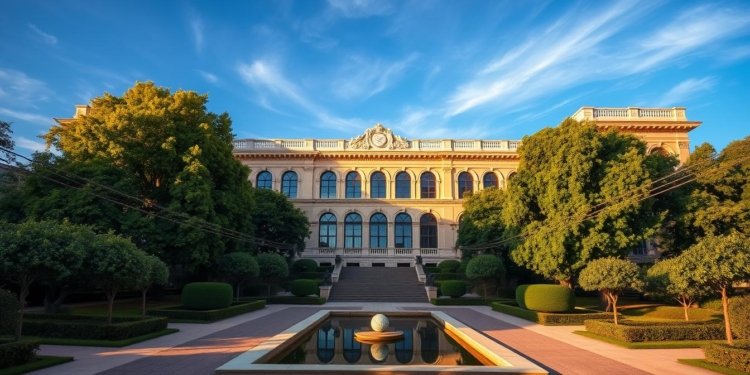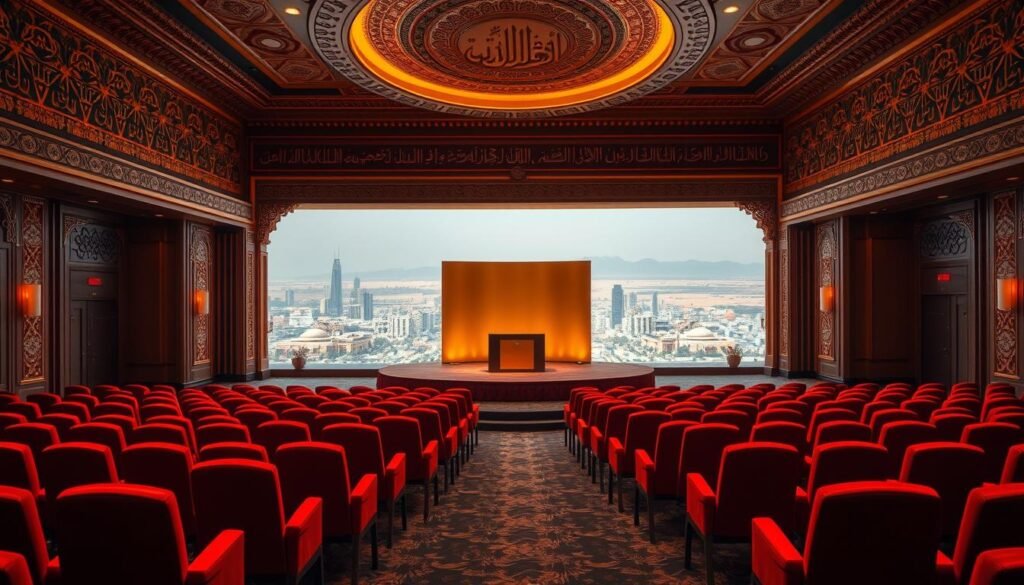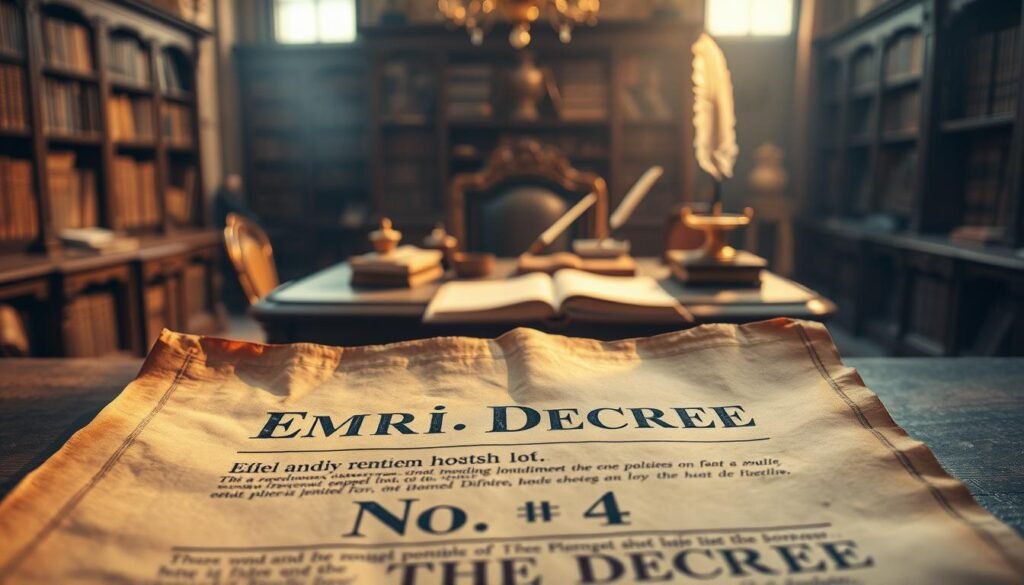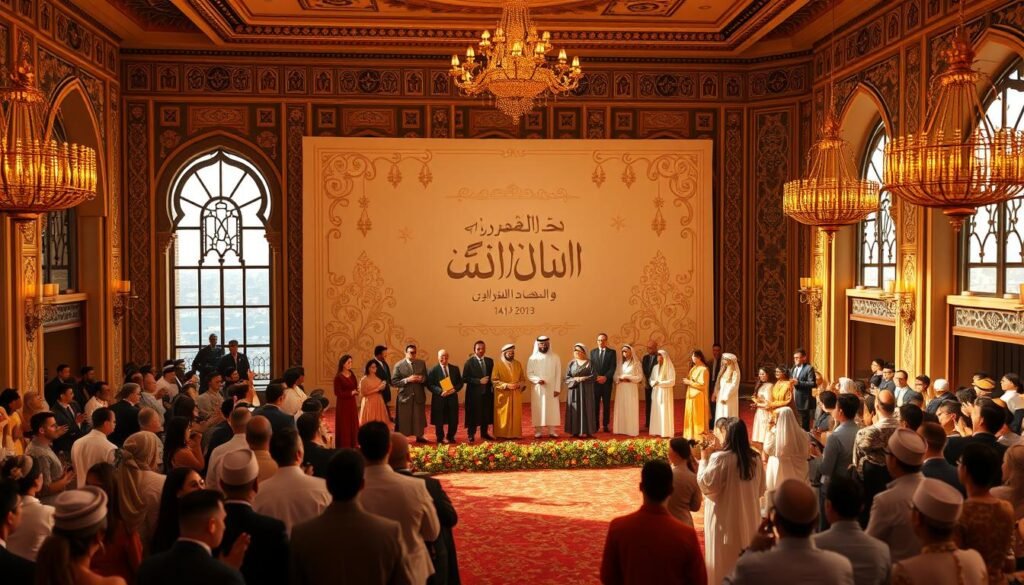Did you know that over 73 Arab innovators have been honored for their contributions to arts and literature since 1987? The Sultan Bin Ali Al Owais Cultural Foundation has played a vital role in preserving and promoting the region’s heritage. Established under Emiri Decree No. 4 in 1994, it remains a cornerstone of UAE cultural institutions.
With an annual awards program worth $600,000, the foundation celebrates creativity across the Arab world. It also organizes events, publishes works, and supports heritage projects. This multi-faceted approach helps bridge tradition and modernity.
Key Takeaways
- Honors Arab innovators with prestigious awards since 1987.
- Distributes $600,000 annually to support cultural achievements.
- Recognizes 73 winners from various Arab nations.
- Founded under Dubai’s Emiri Decree No. 4 in 1994.
- Promotes heritage through events, publications, and grants.
Introduction to the Sultan Bin Ali Al Owais Cultural Foundation
A poet’s dream in 1987 became a cornerstone for regional cultural development. Established by visionary Emirati poet Sultan Bin Ali Al Owais, this initiative aimed to create a sustainable support system for Arab innovators. Today, it stands as a beacon for creativity across literature, arts, and academia.
The foundation’s dual focus combines prestigious Arab cultural awards with long-term infrastructure projects. By honoring excellence and funding cultural hubs, it bridges tradition and modernity. Its strategy aligns with the UAE’s national goals to nurture heritage and innovation.
Partnerships with entities like the Mohammed Bin Rashid Library amplify its reach. Through Dubai arts funding and public programs, it fosters literary arts, research, and community engagement. This multifaceted approach ensures lasting impact beyond ceremonial recognition.
History and Establishment
In 1987, a private initiative laid the foundation for recognizing Arab cultural excellence. Poet Sultan Bin Ali Al Owais envisioned a platform to honor innovators in literature and arts. This vision later grew into a formal institution shaping the region’s creative landscape.
Founding Date and Key Figures
The initiative gained official status in 1994 under Emiri Decree No. 4, issued by Sheikh Maktoum Bin Rashid Al Maktoum. This decree transformed the awards program into a structured entity with a non-profit mandate. H.E. Abdul Ghaffar Hussain, as Head of the General Secretariat, played a pivotal role in its early governance.
Emiri Decree and Official Recognition
The Emiri Decree No. 4 established legal frameworks for funding, governance, and cultural preservation. It marked the shift from a private endeavor to a nationally recognized institution. Today, the foundation’s work reflects its dual origins—celebrating individual achievements while building enduring cultural infrastructure.
The Sultan Bin Ali Al Owais Cultural Awards
Five distinct disciplines receive global recognition through a groundbreaking prize system celebrating Arab excellence. Each year, the program awards $120,000 cultural prize across poetry, fiction, and scholarly fields, empowering recipients to focus entirely on their craft.
Award Categories and Prize Money
The $120,000 cultural prize is divided equally among five categories: Poetry, Fiction/Drama, Literary Studies, Futuristic Studies, and Cultural Achievement. Winners gain financial independence, often dedicating a full year to new projects without constraints.
Evaluation criteria vary by discipline. Poets are judged on linguistic innovation, while Cultural Achievement honors lifetime contributions. This structure ensures diverse talents receive tailored recognition.
Selection Criteria and Inclusivity
Independent committees select winners based solely on merit, disregarding nationality, age, or gender. Past laureates span 14 Arab countries, from Morocco’s novelists to Omani researchers.
Transparency defines the process. Jurors review anonymized submissions, and deliberations remain confidential until announcements. This approach has cemented trust in Arab innovators recognition globally.
Governance and Leadership
Strategic leadership forms the backbone of this influential institution’s operations. The UAE cultural board comprises eminent Emirati figures who guide policy decisions and long-term vision. Their expertise ensures alignment with national cultural priorities while maintaining international standards.
Financial stewardship follows rigorous non-profit governance Dubai protocols. Independent auditors review annual expenditures, while specialized committees oversee grant allocations. This dual-layer system guarantees transparent resource distribution across all programs.
Collaboration with the UAE Ministry of Culture strengthens institutional impact. Joint initiatives amplify heritage preservation efforts and creative industry development. Regular policy dialogues ensure the foundation’s work complements national strategies.
The Board of Trustees implements structured succession planning to maintain continuity. Emerging leaders undergo mentorship programs, preparing them for future governance roles. This approach safeguards the institution’s legacy while fostering innovation in cultural management.
Recent Achievements and News
2025 has been a landmark year for celebrating Arab cultural achievements through prestigious awards and events. The foundation’s initiatives continue to set benchmarks for literary recognition and heritage preservation across the region.
19th Edition Award Winners
June 2025 marked the announcement of laureates across five disciplines, recognizing groundbreaking contributions to Arab literature. Winners included a Syrian poet revolutionizing classical forms and an Emirati researcher documenting oral storytelling traditions.
The selection committee highlighted how this year’s recipients reflect evolving regional narratives. Their works address contemporary themes while preserving linguistic heritage, shaping the future of Arab creative expression.
Book Donations to National Archives
A curated collection of 300 Emirati literary works joined the Mohammed Bin Rashid Library in May 2025. This donation enriches the UAE’s premier research hub with rare manuscripts and contemporary publications.
Specialists praised the inclusion of out-of-print titles and bilingual editions. The acquisition supports academic research while making Arab literary heritage accessible to global audiences.
Emirati Book Day Celebrations
Over 5,000 attendees participated in May’s 2025 cultural events Dubai, featuring 37 authors from GCC countries. The program included live calligraphy demonstrations and panel discussions on preserving indigenous narratives.
Upcoming collaborations with the Beirut Arab International Book Fair will expand this platform. The partnership aims to showcase cross-regional literary dialogues through joint exhibitions in late 2025.
Cultural Impact and Legacy
Cultural recognition takes many forms, from awards to enduring national symbols. The institution’s 25-year milestone was marked by Emirates Post commemorative stamps, blending artistic tribute with historical preservation. These initiatives cement its role in shaping regional identity.
Commemorative Stamps and Cultural Symbols
The limited-edition 1 AED stamps feature micro-calligraphy of award-winning verses alongside Al Owais’ portrait. Only 20-stamp sheets were issued, making them collectors’ items. Each design incorporates palm tree motifs symbolizing growth in Arab creativity.
A special coin bears the inscription “My country flows through my veins” from Al Owais’ poetry. Numismatic experts note how this bridges Emirati heritage with pan-Arab cultural discourse. Over 15,000 stamp sets entered circulation, reaching 22 countries.
Influence on Arab Writers and Scholars
Winners of the awards have published 140+ books and led 73 research projects since 2000. The Arab literary influence extends to university curricula, with 12 Gulf institutions now teaching laureates’ works.
Longitudinal studies show 89% of honorees secured teaching positions or publishing deals post-award. Partnerships with Cairo University and American University of Sharjah have produced critical anthologies of winning texts. This academic integration ensures lasting intellectual impact.
Conclusion
For over three decades, this institution has shaped the region’s creative landscape through UAE arts patronage. Its awards, events, and preservation efforts highlight the power of Arab cultural preservation in a fast-changing world.
Future plans include digital archiving to safeguard rare manuscripts. This project will make literary treasures accessible worldwide. The foundation’s model inspires similar initiatives across the Middle East.
Public participation remains key. Through partnerships and open events, everyone can engage with the region’s rich heritage. Poetry and storytelling continue to define the UAE’s identity, bridging past and future.
FAQ
What is the Sultan Bin Ali Al Owais Cultural Foundation?
The Sultan Bin Ali Al Owais Cultural Foundation is a Dubai-based organization dedicated to supporting arts, literature, and intellectual achievements in the Arab world. It promotes cultural development through awards, events, and educational initiatives.
When was the foundation established?
The foundation was officially established in 1987 under an Emiri decree, recognizing its role in fostering cultural and literary excellence.
What are the Sultan Bin Ali Al Owais Cultural Awards?
These prestigious awards honor outstanding contributions in poetry, fiction, criticism, and humanities. Winners receive significant prize money and recognition for their impact on Arab culture.
Who can participate in the awards?
The awards are open to Arab writers, scholars, and intellectuals whose work demonstrates exceptional creativity and influence in their respective fields.
How are award winners selected?
Winners are chosen by an independent jury based on strict criteria, including originality, depth of research, and cultural significance.
What recent achievements has the foundation celebrated?
Recent milestones include the 19th edition of the awards, book donations to the Mohammed Bin Rashid Library, and participation in Emirati Book Day.
How does the foundation contribute to cultural preservation?
Through initiatives like commemorative stamps, literary events, and support for emerging writers, the foundation helps preserve and promote Arab heritage.
Who leads the Sultan Bin Ali Al Owais Cultural Foundation?
The foundation is governed by a board of trustees and executive leadership committed to advancing its mission of cultural enrichment.
Does the foundation support educational programs?
Yes, it funds scholarships, research projects, and public lectures to encourage intellectual growth and creativity.









